WordAI: The Go-To Tool for Simplifying Content Rewriting?
Editorial Note: We earn a commission from partner links. Commissions do not affect our editors' opinions or evaluations.
Updated June 7, 2024
Published October 15, 2023

Our Verdict
WordAi does a decent job of rewriting articles quickly. Which is useful for people who want to reuse content for their blogs or social media without writing new content from scratch.
The AI-powered article rewriter also does bulk rewrites of up to 1,000 articles at a time. Which could save you time on bulk jobs. WordAi also comes with a rewriter feature specifically designed to help you avoid AI detectors.
We scored WordAi 3.5/5 for its ability to rewrite articles quickly and easily. However, there is plenty of room for improvement. We hope to see major upgrades as the AI undergoes further development.
Best For
People who need to generate bulk rewrites
Pricing
Start at $57/mo. or $27 /mo.billed annually
Free Trial
Three-day free trial available
Pros
- One-click article rewriter
- Rewrite up to 1,000 articles simultaneously
- Custom rewrite settings
- Save your rewrites
Cons
- Some underdeveloped features
- Limited feature set
- Expensive
Rewrite Quality
4.1
Speed
3.6
Features
3.2
Value For Money
3.1
What is WordAi?
WordAi is an AI-powered content-spinning tool. It uses advanced machine learning models to understand and re-write different types of text, including blog posts, product descriptions, social media posts, and more.
WordAi claims that the re-written content is plagiarism-free. And that it is indistinguishable from human writing. WordAi also claims that the generated content can pass AI-detector tests.
The AI’s other key features include:
- Custom rewrite settings
- Bulk rewrites
- API and integrations
Is WordAi Right For You?
We recommend WordAi if:
- You need to rewrite bulk articles quickly
- You produce high volumes of rewrites regularly
- You're a business owner creating content for multiple websites
WordAi isn’t a good pick if you:
- Need to pass AI detectors
- You need the rewritten content to be 100% original
- You need AI assistance to strengthen your writing
Pros & Cons For WordAi
Pros
One-click article rewriter
WordAi is easy to use. Simply insert your text and click “Rewrite.” That’s all there is to it!
Rewrite up to 1,000 articles simultaneously
The bulk rewrite feature potentially lets you rewrite hundreds of articles a day. You can also create multiple versions of each article.
Custom rewrite settings
You can choose how much you want WordAi to change the original article. You can also add custom synonyms that the AI should use, and prevent WordAi from changing specific words.
Save your rewrites
WordAi lets you save your articles so you can access them later if needed.
Cons
Some underdeveloped features
Specifically, WordAi’s rewritten content couldn’t pass our AI detection test, despite this being a core feature.
Limited feature set
WordAi lacks important features, including an AI-powered grammar checker and article/paragraph summarizer.
Expensive
WordAi is expensive considering its limited features and lackluster performance in some areas.
Getting Started With WordAi
It’s easy to get started with WordAi. Visit the WordAi website and click “Try Free”in the top-right corner. We encourage you to take advantage of the free trial and decide for yourself if the tool is worth it.

Next, choose your plan and click “Start my free trial!”
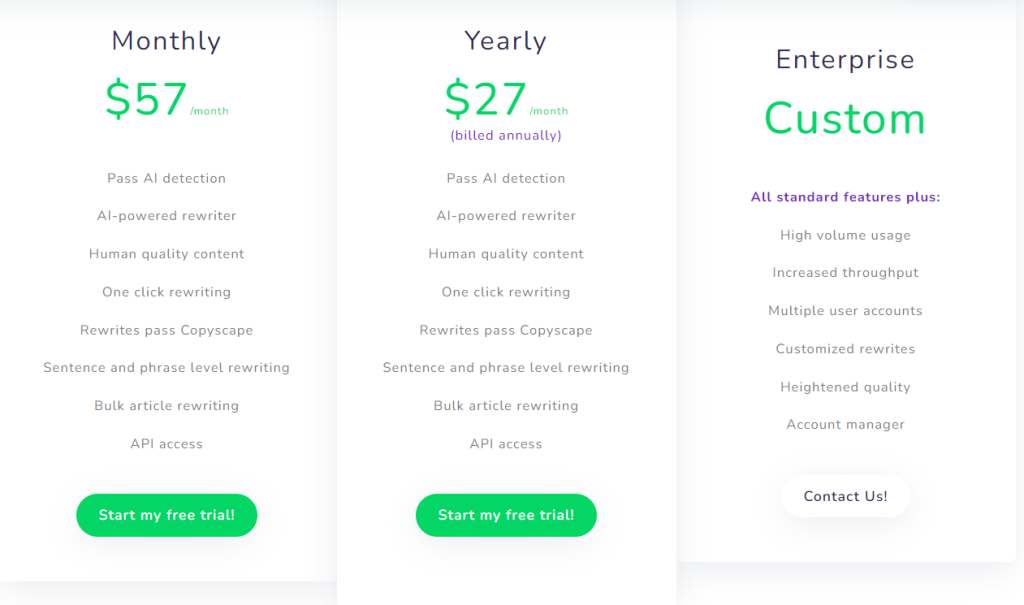
You’ll be asked to enter your name and billing information (credit card number or PayPal address) before you can access the free trial.

Here’s how the dashboard looks. You can access the AIs features on the left panel.
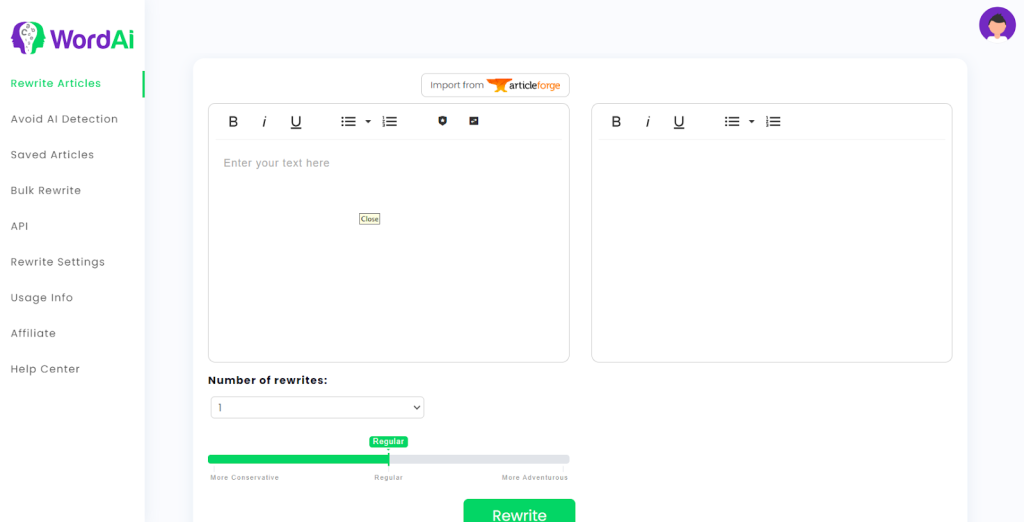
Let’s see if WordAi lives up to its promise!
Rewrite Articles
WordAi can rewrite your articles in seconds. Open “Rewrite Articles” from the left menu and copy/paste your text in the content editor.
The AI lets you choose from More Conservative, Regular, and More Adventurous modes. These control how creative and ambitious the AI is when rewriting your content.
You can also specify the number of rewrites the AI should produce, between one and four rewrites.
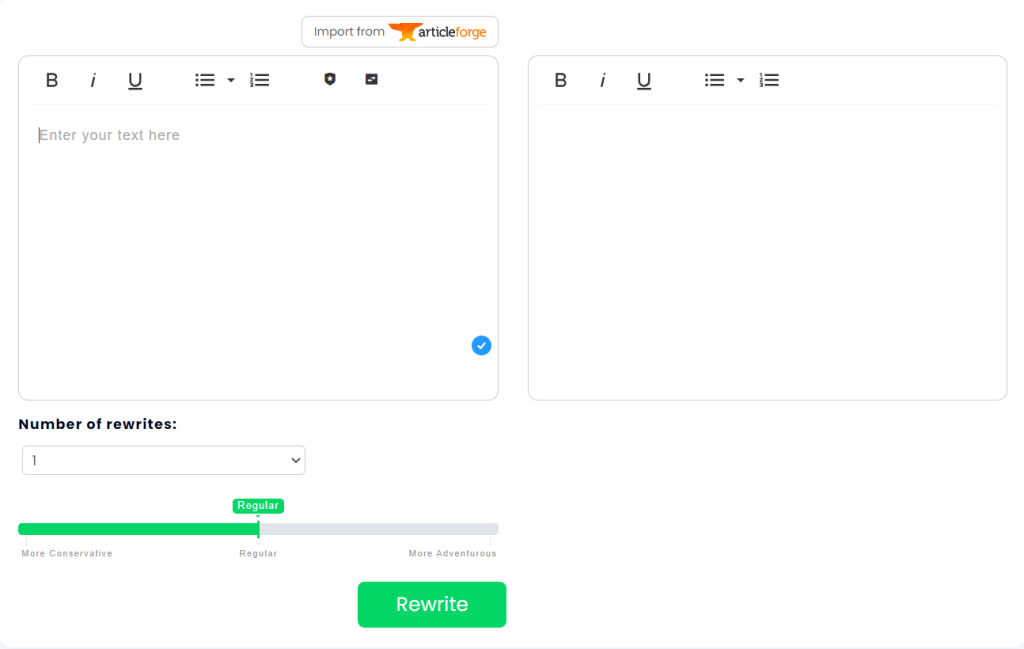
We started with Regular mode, which is the AI’s default rewriting mode. It’s supposed to ensure that the rewritten content is both original and informative.
Here’s a sample of the original text we used. It’s taken from a Reuters article.

Below you’ll see WordAi’s rewrite. There are no factual inconsistencies, and the AI does a good job of conveying the same core information.
The AI also rearranged some words, and the style is slightly different from the original version. WordAi’s version is more casual than our original, more formal text.

Taking just one example, the original text uses the term “electric compact sports-utility vehicles (SUVs)” while WordAi’s version rearranged the adjectives to “compact eclectic sports-utility vehicle (SUVs)”.
There are no complaints in terms of WordAi’s ability to convey the same message in different words. But, the AI did introduce slight grammatical errors in its rewritten version.
Going back to the above example, it should be “compact electric sports-utility vehicles (not vehicle)”. Because the grammatical number of vehicle doesn’t agree with the previous statement, “it would offer two…”
Similarly, the word “medium-sized” is typically hyphenated, which wasn’t the case in the AI’s rewritten text.
We did many more rewrites. And the other versions were flawless. Like this rewrite that didn’t have any grammatical mistakes.

We also tried the More Conservative mode. The generated content in this mode is supposed to be more similar to the original text.
Here’s one of the rewrites WordAi provided:

Again, there was a slight issue with not hyphenating the word “medium-sized.” Otherwise, the text conveyed the original message accurately. And there were no further grammatical errors.
And here’s WordAi’s rewrite using More Adventurous mode. Ideally, the content in this mode should be more creative and original than the other two settings.
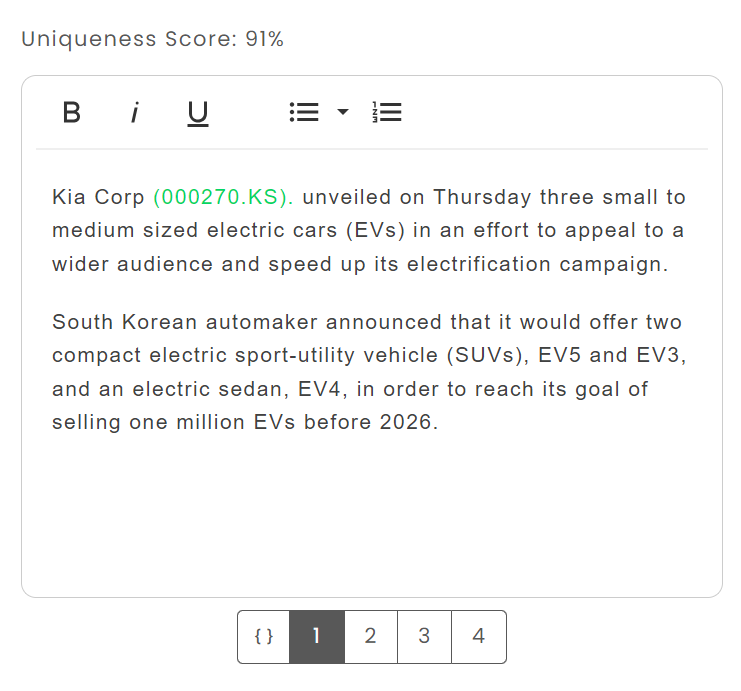
This version again conveyed the original message accurately. But there were a few errors:
- It should be “medium-sized”, not “medium sized”
- It should be “The South Korean automaker announced,” not “South Korean automaker announced”
- It should be “electric sport-utility vehicles,” not “vehicle”
We like that WordAi also gives you a uniqueness score for the original vs. rewritten text. Regular was 88%, More Conservative 78%, and 91% for the More Adventurous mode.
So, if you’re looking for a unique rewrite, the More Adventurous mode is the way to go. The 91% uniqueness score is still considered original.
Overall, WordAi does a decent job of rewriting text without distorting the message. However, you’ll want to proofread the generated text to ensure it's correct before publishing.
Unfortunately, WordAi doesn’t have a built-in grammar checker. So you’ll need to use an external tool or proof your content manually.
Avoid AI Detection
WordAi has an Avoid AI Detection feature to help you bypass AI detectors. It’s supposed to rewrite your content to make it read more human-like.
We used ChatGPT to generate two paragraphs for this exercise.
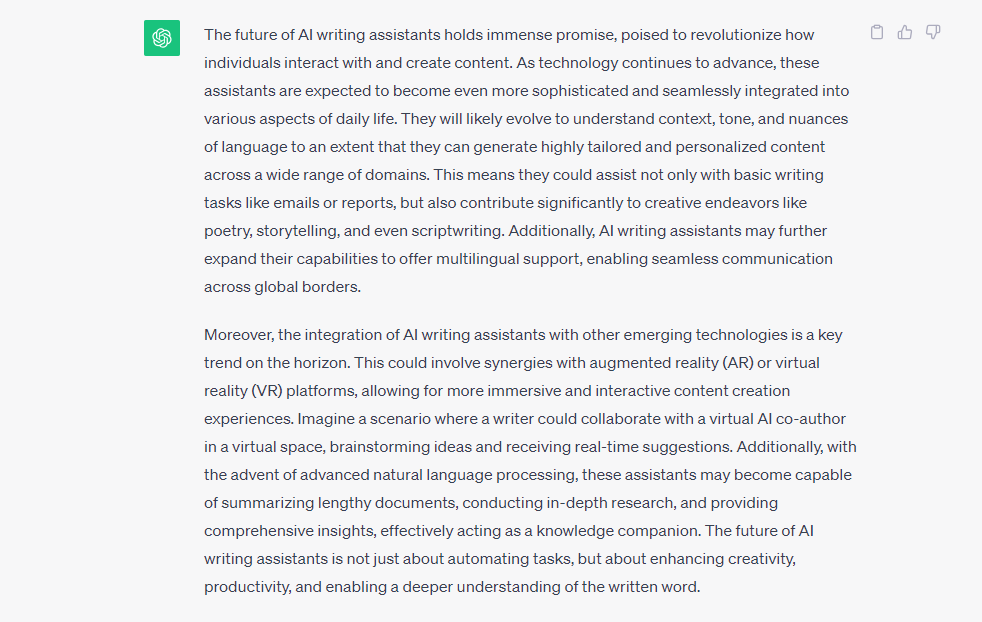
We passed it through the Copyleaks AI detector. It immediately identified that the content was indeed AI-generated, so we had a good baseline to proceed with the text.
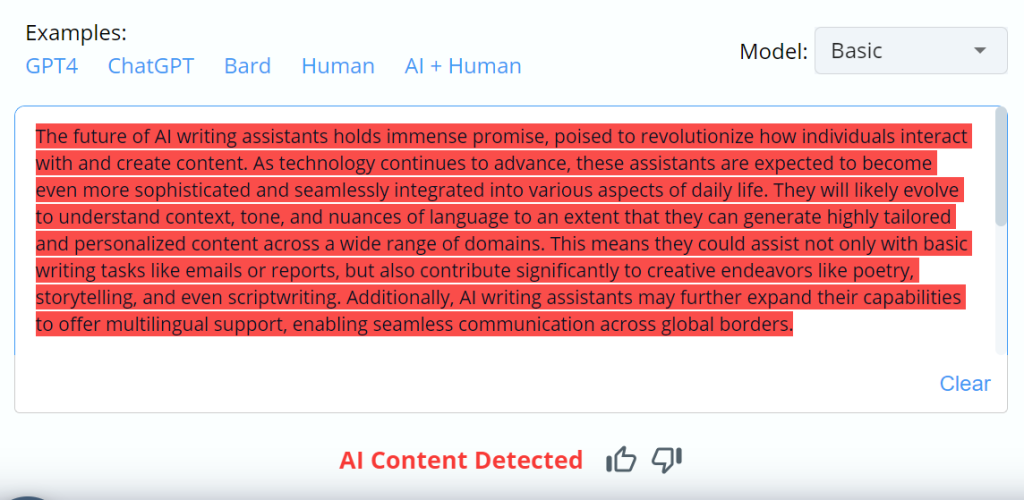
Next, we used WordAi to rewrite our AI-generated content from the previous step. There’s a slider that lets you specify how much you want WordAi to change the original text.
We chose the max setting, allowing WordAi to change as much of the original text as possible. Hopefully, this setting would give WordAi maximum opportunity to bypass the AI detector.
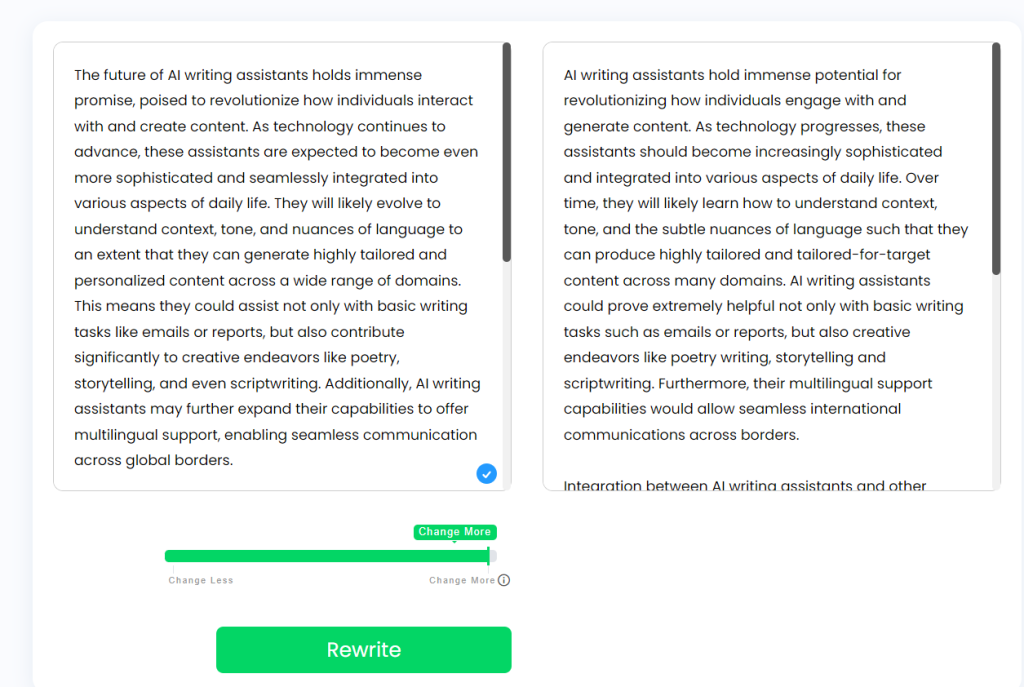
We tested WordAi’s version using Copyleaks. Unfortunately, WordAi’s rewrite failed the AI detection test.
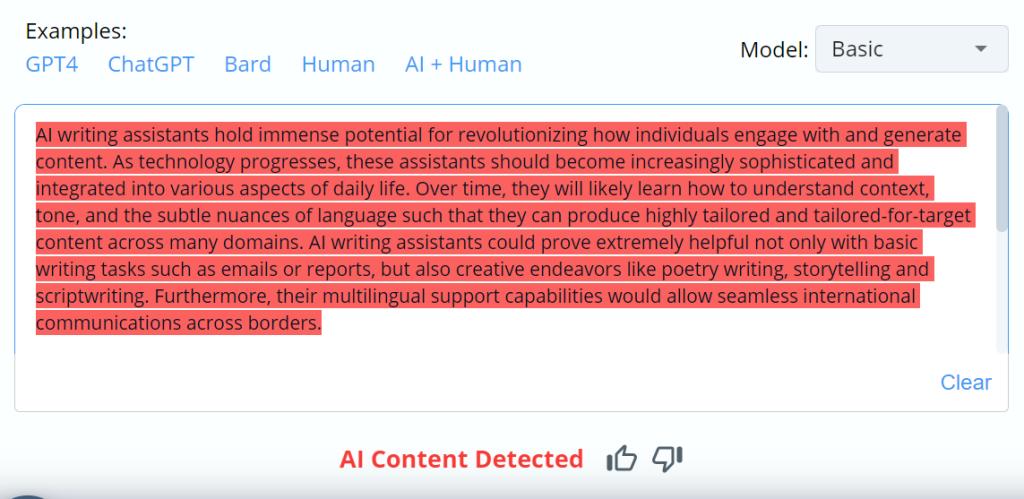
We also tested human-written content using the same AI detector as a control test. Just to make sure that the tool was accurate.
This time, the human-written text passed the AI detection test.
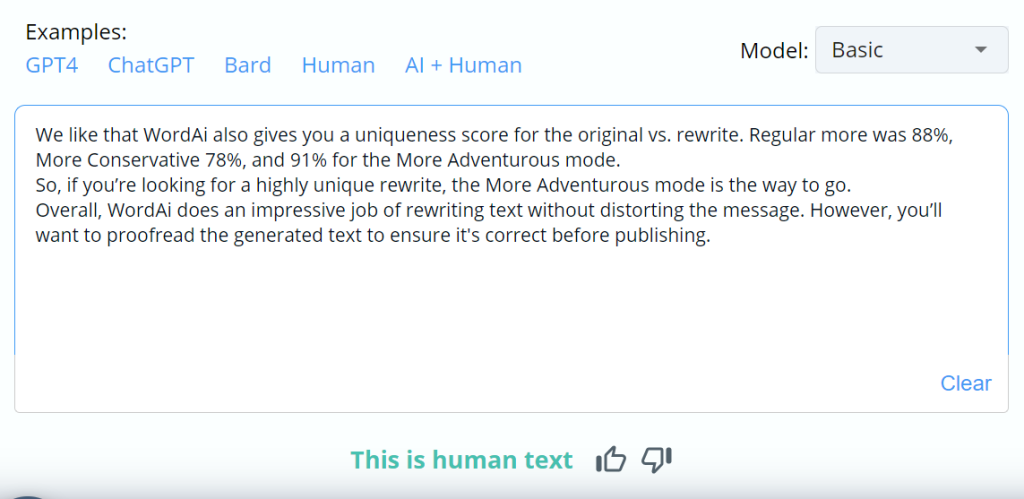
We tried playing around with the settings, asking WordAi to change less of the original text. But none of the AI’s rewrites could pass the AI detection test.
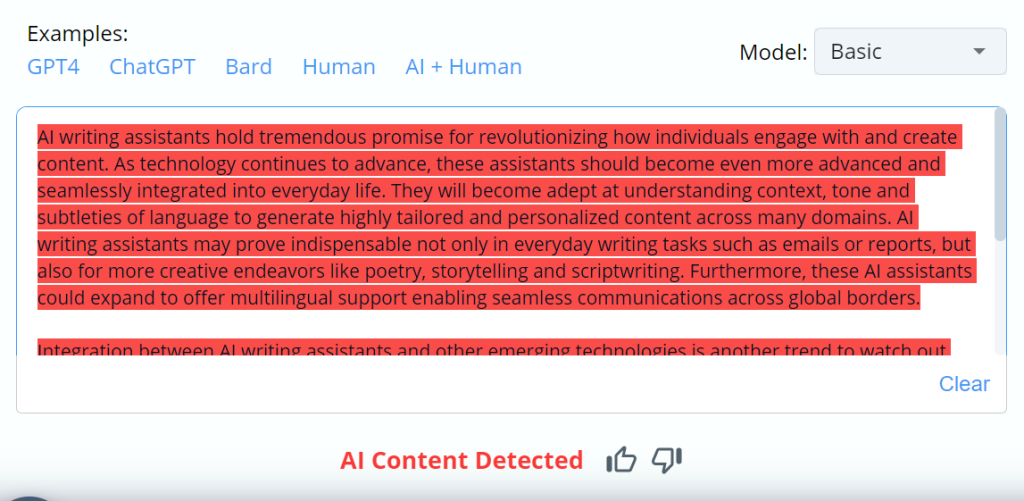
It’s worth mentioning that AI detectors aren’t 100% accurate and do sometimes provide false positives. However, we implemented multiple controls to ensure that the test was objective and accurate.
WordAi simply couldn’t rewrite our AI-generated content to pass AI detection. It’s a core feature in WordAi, and we were disappointed that it didn’t work.
Bulk Rewrite
The Bulk Rewrite feature lets you rewrite up to 1,000 articles simultaneously. And you can create up to four rewrites for each article.
It’s a good feature if you need to rewrite articles in bulk. Simply upload a file with the articles and let the WordAi rewrite them for you.
WordAi only accepts uploads for two file types. That is CSV and TXT.
We tried bulk rewrite using the TXT files, and the overall result was pretty good.

Here’s one of the original text samples we used, passed through a grammar checker. Notice that there are no mistakes.

And here’s one of the bulk rewrites passed through the same grammar checker. This time, there are a few minor mistakes (underlined in yellow and blue).
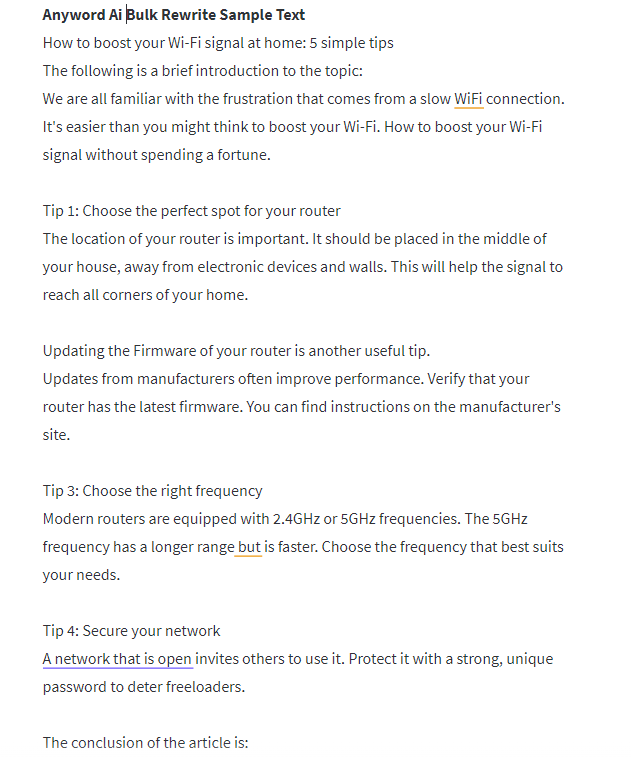
For example, the officially approved term is Wi-Fi, not WiFi. There’s also a missing comma, and one of the phrases could be more concise.
But overall, these are simple mistakes that are easily corrected by a human editor or grammar checker.
We also tried the bulk rewriter using CSV files, this time with longer texts.
It took a few minutes to rewrite all seven articles (around 7000 words total), so we imagine it would be quite the wait for hundreds of rewrites.
Still, it was faster than manually spinning each article.
There were also more instances of misspelled words and incorrect punctuation usage with the longer article rewrites. Not any more than you’d expect from a first draft by a human writer. But the point is the rewrites weren’t perfect.
Again, this is where a built-in grammar checker would have been helpful given the scope of the job. Nonetheless, WordAi doesn’t offer one.
WordAi does integrate with PerfectTense which can help you check the quality of your rewrites before publishing.
However, PerfectTense has a limited free plan, so you’ll most likely need to purchase a subscription. The extra cost and effort is likely not worth it for most people.
Pricing
WordAi works on a subscription model. There is no free plan. But, there is a three-day free trial to test the tool before you’re ready to purchase a subscription.

The Monthly and Yearly plans offer the same features. Including AI-powered Rewrite Articles, Avoid AI Detection, and Rewrite Articles.
The only difference is the price. The Monthly plan costs $57 per month, while the Yearly plan costs $27 per month. You’ll save $30 per month if you choose annual vs. monthly billing.
The Enterprise plan offers additional features and functionality. These include multiple user accounts, high-volume usage, custom rewrites, and more. But you’ll have to contact WordAi for a custom quote.
Final Thoughts on WordAi
WordAi could be a useful tool if it were free. But, the AI over-promises on multiple fronts, making it a poor option for most people.
Its Pass AI Detection feature failed multiple tests during our review. While the AI-Powered Rewriter is nothing special to write home about. Moreover, WordAi doesn’t have a built-in grammar checker to proofread your articles before publishing.
There are many free tools that could get you the same quality of rewriting, including ChatGPT and other similar AIs. Consequently, we have a difficult time recommending this tool based on our rigorous tests and extensive experience with similar AIs.
Frequently Asked Questions
Share This Post
Della Yang
Della Yang is a marketing professional with a passion for the ever-changing digital landscape. She frequently writes tech news and reviews, sharing her knowledge and insights through blogs and various online platforms.
Allow cookies
This website uses cookies to enhance the user experience and for essential analytics purposes. By continuing to use the site, you agree to our use of cookies.




![Writesonic: What is It and a Detailed Review [2025]](https://cdn.sanity.io/images/isy356iq/production/844eba596ba3b4d503bcbf691166bfc868fc495d-1200x800.png?h=200)

![Forefront AI: What is It and a Detailed Review [2025]](https://cdn.sanity.io/images/isy356iq/production/5b0437692ad6b4511f8bb7769cce258b7cbda039-1200x800.jpg?h=200)

![Wordtune: What is It and a Detailed Review [2023]](https://cdn.sanity.io/images/isy356iq/production/eab0cd6cf9ef3b7e9fee29d61d70c2da11ed7bea-1200x800.png?h=200)
![Hypotenuse AI: The AI Content Writer Can Truly Write in Your Voice? [2025]](https://cdn.sanity.io/images/isy356iq/production/db00ce44b7f69c17369281695d40e44264eda853-1200x800.jpg?h=200)
![Jotbot AI: The Best AI Assistant for Writers and Researchers? [2025]](https://cdn.sanity.io/images/isy356iq/production/3056b3b8ecb28abeca489236b7458562078b1810-1200x800.jpg?h=200)